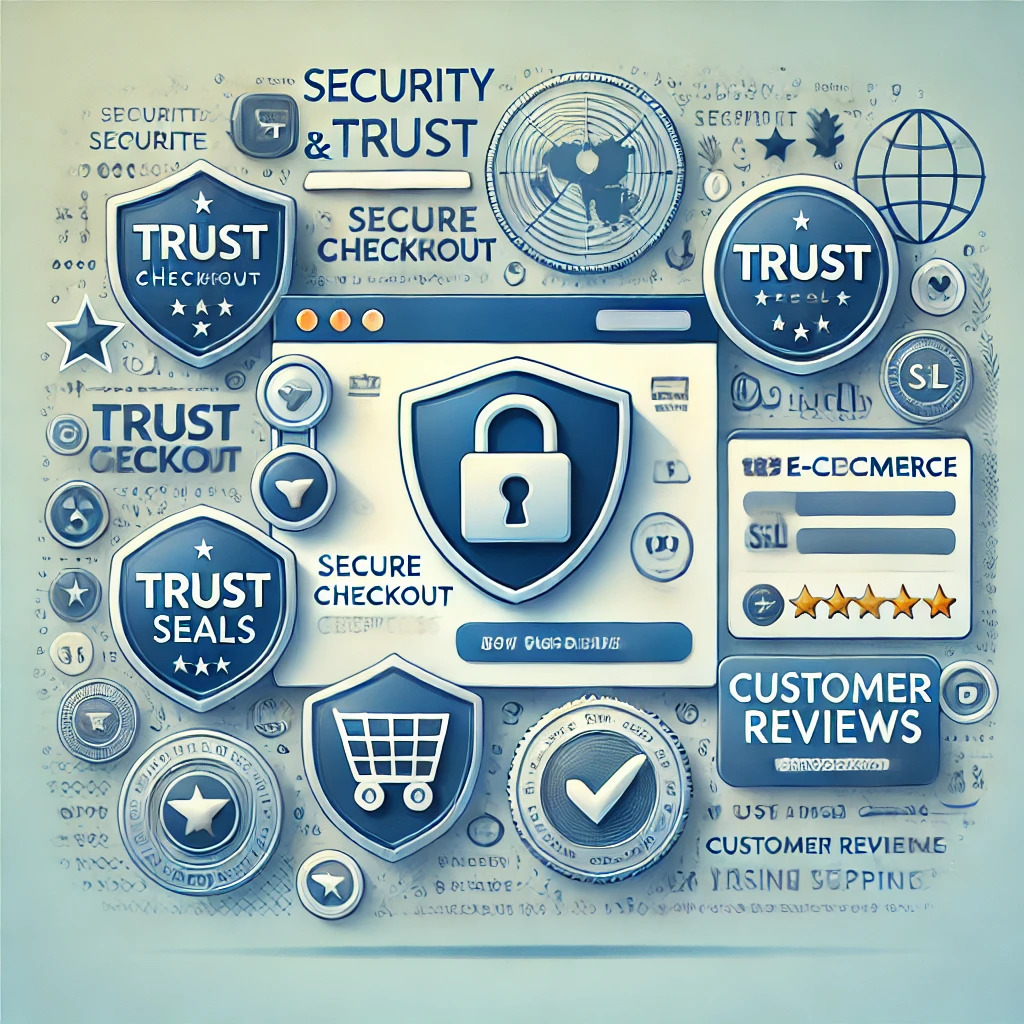
In the competitive world of e-commerce, building customer trust is essential to ensuring long-term success. Customers are often cautious when making online purchases due to concerns over security, product quality, and overall shopping experience. To build e-commerce trust, it’s crucial to address these concerns by creating a secure, transparent, and customer-friendly shopping environment. This article explores several key strategies that can help you establish trust with your customers, ranging from website security to providing excellent customer support, all of which play vital roles in boosting your credibility.
Building a Secure and User-Friendly Website Experience

In the world of e-commerce, one of the most crucial factors that influence a customer’s decision to purchase is trust. If a customer does not feel secure when browsing your online store, they are unlikely to make a purchase. To build e-commerce trust, it’s essential to ensure that your website is both secure and user-friendly, offering a seamless browsing experience that makes customers feel confident in their decision.
First and foremost, website security is vital for establishing trust. A website that is not secure sends a red flag to potential customers, who may be concerned about their personal information being compromised. One of the simplest and most effective ways to secure your site is by implementing an SSL (Secure Socket Layer) certificate. This encrypts sensitive information like credit card details, making sure that data is transmitted safely between the customer and your site. A visible sign of an SSL certificate is the “HTTPS” prefix in your URL and the padlock icon in the browser’s address bar. These symbols help build e-commerce trust by assuring customers that their data is protected.
Additionally, offering secure and diverse payment gateways is a significant factor in building e-commerce trust. Many customers look for multiple payment options such as credit cards, PayPal, and digital wallets like Apple Pay or Google Pay. By integrating these trusted payment platforms into your e-commerce site, you are giving customers peace of mind, knowing that their transactions are secure and handled by well-established companies with strong reputations for safety.
Another key component of a trustworthy e-commerce site is providing a user-friendly experience. When customers visit your online store, they should be able to navigate it easily, find what they’re looking for, and complete their purchases with minimal hassle. A cluttered, confusing website will frustrate visitors and likely deter them from making a purchase. Streamlining the design, optimizing product search functions, and simplifying the checkout process all contribute to a positive user experience. In fact, a clean and intuitive website not only helps customers navigate with ease but also plays a significant role in building e-commerce trust by showing that your business is professional and cares about the customer’s experience.
Showcasing Customer Reviews and Testimonials

One of the most powerful ways to build e-commerce trust is by showcasing authentic customer reviews and testimonials on your website. Consumers today are more cautious than ever when shopping online, and they often rely on the experiences of other customers to make purchasing decisions. Displaying genuine feedback not only validates your products and services but also demonstrates a commitment to customer satisfaction, building credibility with potential buyers.
Customer reviews and testimonials serve as social proof, a psychological phenomenon where people rely on the actions and opinions of others to guide their own decisions. When customers see that others have had positive experiences with your brand, it reassures them that they are making the right choice. This can significantly help build e-commerce trust by showing that your products or services are reliable and meet the expectations of previous buyers.
A key factor in building e-commerce trust through reviews is authenticity. Customers are skeptical of overly polished or generic reviews, and they often look for honest, unfiltered opinions. Encouraging real customers to leave detailed reviews, complete with both positive and constructive feedback, can go a long way in establishing credibility. This kind of transparency shows that you value customer input and are committed to continuous improvement, which further builds trust with new visitors.
Additionally, displaying ratings alongside reviews adds another layer of trustworthiness. Star ratings give potential customers a quick snapshot of the product’s overall quality and help them gauge whether it meets their standards. A high rating, combined with thoughtful reviews, reinforces your reputation as a reliable seller and makes your products more appealing.
It’s also essential to actively engage with customer reviews, whether they are positive or negative. Responding to reviews shows that you care about your customers’ opinions and are invested in providing excellent service. A timely response to a negative review, for instance, can turn a dissatisfied customer into a loyal one, as they feel their concerns are being addressed and resolved. This level of customer care plays a pivotal role in building e-commerce trust by showing that you prioritize customer satisfaction above all.
Transparent Product Information and Clear Return Policies

When it comes to building e-commerce trust, transparency is a critical factor that influences a customer’s purchasing decision. By providing accurate, detailed product descriptions and having clear, customer-friendly return policies, you demonstrate your commitment to honesty and customer satisfaction. These practices not only foster trust but also enhance the overall shopping experience, making customers feel more confident in their decisions.
One of the most effective ways to build e-commerce trust is by offering thorough, honest product descriptions. Customers rely on product details to understand what they are buying, and when these descriptions are clear and accurate, it eliminates the guesswork. Inaccurate or vague product descriptions can lead to dissatisfaction, returns, and lost trust. Therefore, it’s essential to include comprehensive details such as material specifications, dimensions, usage instructions, and care recommendations. If the product has any limitations or requires special handling, this information should be presented upfront. Being transparent in your product descriptions not only reduces the likelihood of returns but also demonstrates your dedication to providing customers with all the information they need to make informed decisions.
Along with clear product descriptions, a transparent and customer-friendly return policy is another key component in building e-commerce trust. Shopping online can often feel uncertain because customers cannot physically inspect products before purchasing. Offering a clear, easy-to-understand return policy gives customers peace of mind, knowing that they have the option to return or exchange products if they are not satisfied. An overly complicated or restrictive return policy can deter potential buyers, as it signals that the business is not fully confident in its products or services. On the other hand, offering hassle-free returns shows that you stand behind your products and care about the customer experience.
In addition, consider including information about the process and timelines for returns, as well as any exceptions or conditions. Make sure that return instructions are easily accessible and prominently displayed on your website. This level of transparency and clarity helps to build e-commerce trust by assuring customers that they won’t face any unexpected issues should they need to return a product.
Providing Excellent Customer Support

When it comes to building e-commerce trust, offering exceptional customer support is one of the most important strategies for establishing a long-term relationship with your customers. A responsive and helpful support team reassures customers that they can rely on your brand for assistance whenever they encounter issues or have questions about products or services. By offering multiple support channels such as email, live chat, and phone, you ensure that customers can easily reach out for help in a way that suits them best.
Responsive customer support shows that you care about your customers’ needs and are invested in providing them with timely assistance. A customer who encounters an issue with a product or a question about a service should never feel ignored or left to fend for themselves. By offering a range of communication options like live chat, email, or phone support, you make it easier for customers to get the answers they need when they need them. This level of accessibility is crucial to build e-commerce trust, as it makes your business appear more approachable and reliable. When customers can get in touch with you effortlessly, they feel confident that their concerns will be addressed quickly.
In addition, providing timely responses to inquiries and resolving issues efficiently can significantly strengthen the trust customers place in your brand. A slow or unhelpful response can have the opposite effect, leading to frustration and a negative customer experience. In contrast, offering quick, thoughtful solutions not only boosts customer satisfaction but also enhances your reputation as a trustworthy retailer. By making sure your customer support team is well-trained, empathetic, and able to provide accurate solutions, you show that you prioritize your customers’ needs above all else.
Furthermore, proactive customer support can also play a role in building e-commerce trust. Offering FAQs, knowledge bases, or tutorial videos can help customers solve common problems without needing to contact support. This can enhance their overall shopping experience and increase their confidence in your brand’s reliability and expertise.
Leveraging Social Proof and Trust Seals

One of the most effective ways to build e-commerce trust is by leveraging social proof and trust seals on your website. These elements play a crucial role in reassuring potential customers that your business is legitimate, reliable, and worthy of their trust. By displaying certifications, trust seals, and endorsements from well-known brands or organizations, you help instill confidence in your visitors and make them feel more secure in their purchasing decisions.
Trust seals are symbols displayed on websites to indicate that the site is secure and trustworthy. They are often provided by third-party organizations that specialize in website security, payment processing, or privacy. Common trust seals include SSL certificates, which indicate that the site uses encryption to protect sensitive data, as well as payment provider seals from trusted platforms like PayPal, Visa, or MasterCard. These trust seals are highly visible, and customers have come to associate them with secure and safe online transactions. By prominently displaying these seals, you can immediately address any concerns about the security of your site and build e-commerce trust with potential buyers.
Another way to build e-commerce trust is through certifications and endorsements from reputable organizations. If your business has earned certifications related to your industry or product, such as eco-friendly or ethical production certifications, displaying these badges on your website can greatly enhance your credibility. For example, certifications like “Certified Organic” or “Fair Trade Certified” indicate that your products meet certain standards and align with customer values, further instilling trust. Similarly, if you are a member of a respected industry association or have received recognition from trusted organizations, showcasing these affiliations can lend additional legitimacy to your e-commerce store.
Social proof also plays a vital role in building e-commerce trust. When potential customers see that others have had positive experiences with your brand, it reinforces the belief that they too will have a satisfying purchase experience. User-generated content, such as product reviews, customer testimonials, and ratings, helps create a sense of community and reliability. Displaying these reviews prominently on your product pages or even on your homepage can make new visitors feel more comfortable and confident in their decision to buy from your store.
Conclusion
Building e-commerce trust goes beyond just security measures and user experience; it’s also about keeping up with industry best practices. One valuable resource for learning more about e-commerce security and customer trust strategies is Shopify’s Guide to Building Trust with Your Customers. This comprehensive guide provides actionable insights and tips on enhancing your store’s credibility, ensuring that you provide a secure, reliable experience that keeps customers coming back. By integrating these strategies into your business, you can take significant steps toward building lasting trust with your audience.
In conclusion, building e-commerce trust requires a combination of strategies designed to enhance security, transparency, and customer satisfaction. By implementing website security features such as SSL certificates, offering clear product descriptions, showcasing customer reviews, and providing exceptional support, you can create a shopping environment where customers feel confident in their decisions. By consistently applying these tactics, you will not only build e-commerce trust but also foster a loyal customer base that continues to engage with your brand.
For more details or to discuss your specific e-commerce platforms requirements, visit our AI Scope Digital page.

